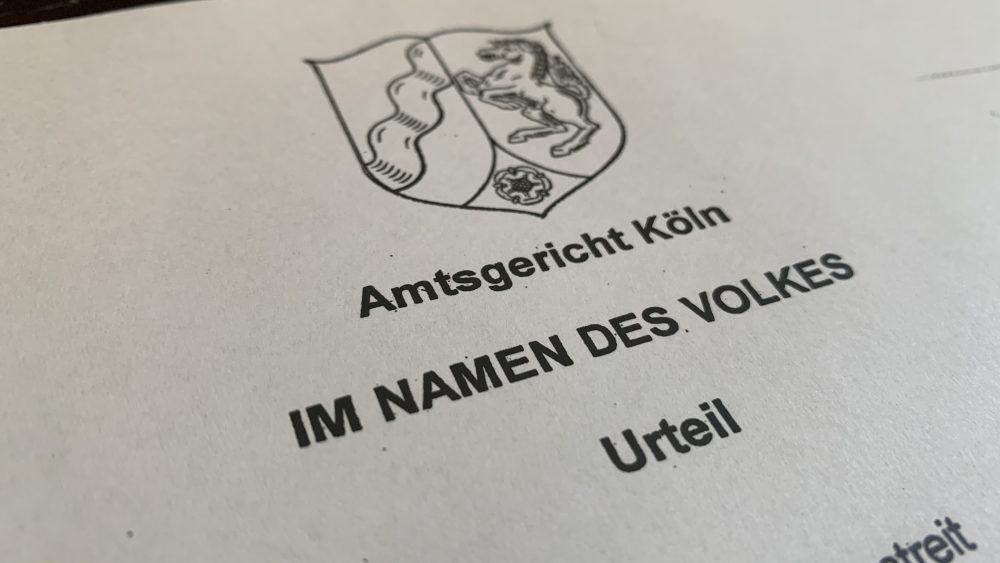Expert fee BVSK table
In May 2017, the Local Court of Cologne ruled in a traffic accident case under case number 263 C 35/17 that the expert fee must generally be compensated by the injured party, unless the injured party recognizes that the fees are significantly higher. A reference to the BVSK table does not lead to a justified adjustment of the expert fee.
The Cologne Local Court has ruled:
The defendant is ordered to pay the plaintiff € 48.36 plus interest in the amount of 5 percentage points above the respective base interest rate since March 12, 2017.
The remainder of the action is dismissed.
The defendant is ordered to pay the costs.
The judgment is provisionally enforceable.
The appeal is not admitted.
In accordance with sections 495a and 313a (1) of the German Code of Civil Procedure (ZPO), the facts of the case are not presented.
Reasons for decision – Expert fee BVSK table
The complaint is essentially well-founded.
The plaintiff has a claim against the defendant for payment of further expert fees in the amount of € 48.36 (§§ 7, 18 StVG, 115 VVG).
Necessity of the costs according to § 249 BGB
The costs are necessary within the meaning of Section 249 BGB. After a traffic accident, the costs for the preparation of a damage assessment by an expert can be demanded as necessary production costs within the meaning of Section 249 (2) BGB. These costs are part of the financial disadvantages directly associated with the damage and to be compensated in accordance with Section 249 (1) BGB, insofar as the expert opinion is necessary and expedient to assert the claim for damages (see BGH, NJW 2007, 1450; VersR 2005, 380; NJW RR 1989, 953). What is necessary and expedient in this respect depends on the point of view of a reasonable, economically minded person in the position of the injured party at the time of commissioning (BGH, NJW 2005, 356).
Indicative effect of the fee invoice
In the present case, the amount of the invoice is indicative of the necessity. It is not the amount of the invoice issued by the expert as such, but only the actual expenditure incurred by the injured party in accordance with the invoice and the price agreement on which it is based that serves as an indication for determining the amount required for production within the meaning of Section 249 BGB (BGH, judgment of 26.04.2015, VI ZR 50/15). This is because the special circumstances of the injured party must be taken into account, including their possibly limited knowledge. This is the case here. The plaintiff paid the remaining € 48.367 to the expert. He has substantiated and proven this by submitting an account statement from his lawyer. The defendant did not oppose this.
The defendant was also unable to shake this circumstantial effect. To do so, it would have had to provide substantiated evidence from which the injured party could see that the prices calculated by the expert were significantly higher than the usual prices, so that they were set quasi-arbitrarily. The defendant did not demonstrate this.
The mere reference in the settlement letter to the settlement of the table of HUK-Coburg is not sufficient for this, as this is a non-binding agreement between the defendant and some experts. It has not been submitted that the expert commissioned by the plaintiff joined the agreement.
Reference to BVSK table
The reference to the BVSK table 2015 does not apply either. With regard to the basic fee, the assumption of an arbitrarily excessive determination can be ruled out because the basic fee is 4.29 % above the HB V framework (€ 382 to € 419) for the relevant value in dispute, namely 104.29 %.
The defendant has also not explained why the invoiced ancillary costs are obviously excessive. The ancillary costs are certainly higher than the ancillary costs according to the BVSK table (25.6 km x € 0.70 = € 17.92), which the court uses as a basis for estimation within the meaning of Section 287 ZPO in established case law. However, there is no evidence of an arbitrary overrun. This is because the overrun is only 28%.
Even when looking at the total invoice, there is no arbitrary overcharge. According to BVSK-2015, the expert could have billed €419 net plus €17.92 travel costs, a total of €436.92 net for the relevant object value. The amount actually invoiced is only 5.28 % higher than this amount (€ 459.97 x 100 / € 436.92 = € 105.28).
Interest claim
The claim for interest is based on Sections 280, 286, 288, 291 BGB. An earlier commencement of interest has not been demonstrated. In particular, default did not occur upon receipt of the lawyer’s letter dated 06.01.2017. The letter does not contain a reminder. Nor did default occur when the letter of 10.02.2017 was received, nor when it was received by the plaintiff’s legal representative on 13.02.2017. A debtor can also be in default without a reminder if they seriously and definitively refuse to pay. However, this cannot be inferred from the letter dated 10.02.2017. The letter contains a mere statement of account with reasons, but no indication that the refusal is to be understood as “the last word” of the debtor.
The procedural ancillary rulings are based on Sections 91, 708 No. 11, 711, 713 ZPO.
The appeal is not permitted because the case is not of fundamental importance and the further development of the law or the safeguarding of uniform case law does not require a decision by the Court of Appeal.
–
You can find more articles on this topic here.
Do you have further questions about this or a similar issue? Then please here contact us here!
Back to the homepage Lawyers Römer



Comments are closed.